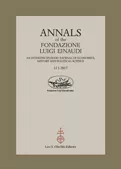During the Italian interwar period, the Istituto Nazionale delle Assicurazioni (INA), a state insurance company, opened up a large national market in small-sum and collective life insurance policies. This article provides a historical account of the firm’s expansion in the larger context of the savings and social policy initatives of the fascist regime. I argue that INA’s mission as a commercial entity pursuing social objectives remained in substantial continuity with that of its founding in the pre-war liberal era. However, INA pursued a multi-faceted strategy that embraced the regime’s social and economic policy objectives, positioning itself at the focal points of fascist institutional proliferation, while availing itself of support from both the heights of the dictatorship and grassroots fascist organizations to expand. INA’s centralization of voluntary previdenza, conceived of in the period as a special form of savings with distinctive moral characteristics, eventually drew it into conflict with the country’s nascent social security institute (INPS). Examining the dynamic of inter-institutional competition between fascist elites at the helm of both institutes, I argue, reveals both the extractive function and broad interpenetration of Italy’s parastatal financial and social insurance institutions in their historical emergence under Fascism.



